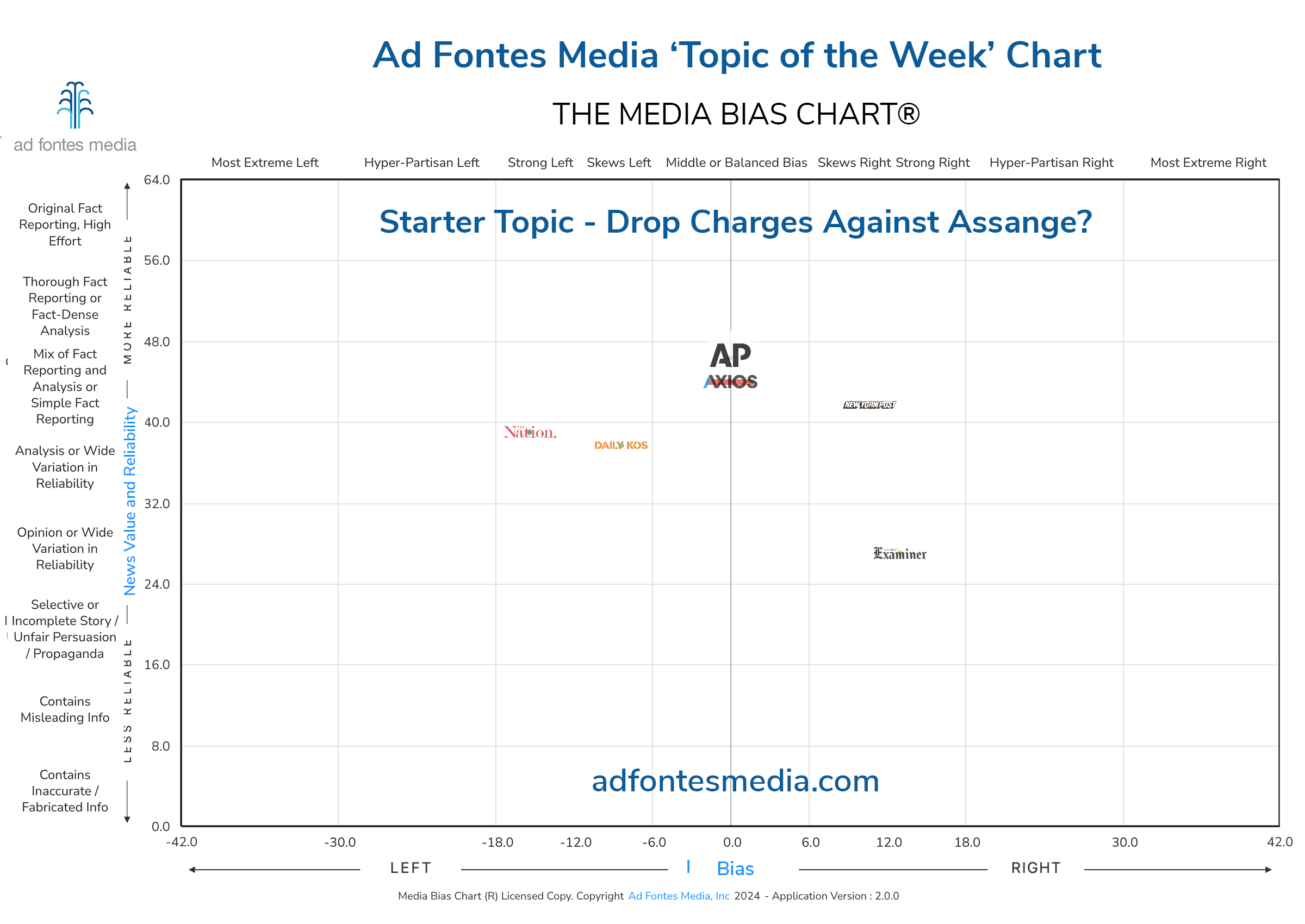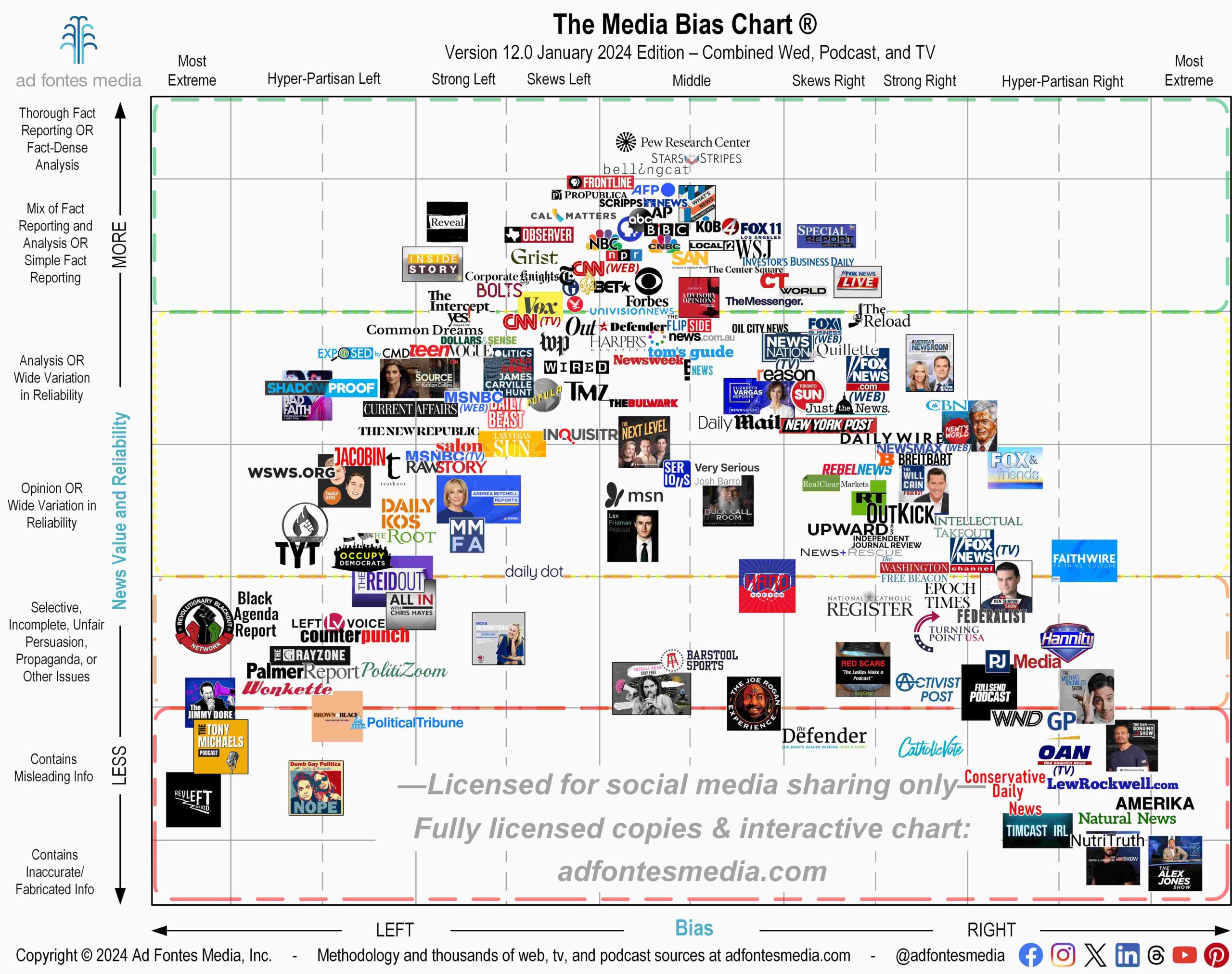Menu

Will President Biden Drop Charges Against Julian Assange?
The Media Bias Chart takes a look at articles covering President Biden considering request to drop charges against WikiLeaks founder Julian Assange
Author:
Sara Webb
Date:
04/19/2024
Julian Assange is the founder of WikiLeaks, which publishes a searchable database of leaked documents from around the world. It was “established to obtain and disseminate classified documents and data sets from anonymous sources and leakers,” according to NBC. There is a high probability that Russia was involved in helping WikiLeaks obtain thousands of emails from Hillary Clinton during her presidential campaign, ultimately helping Donald Trump achieve victory.
The case in the news last week focuses on Assange’s actions against the U.S. government: “WikiLeaks released hundreds of thousands of U.S. military documents and videos from the Afghan and Iraq wars… They also released a trove of more than 250,000 State Department diplomatic cables in 2010. Former U.S. soldier Chelsea Manning was convicted of leaking the documents,” the NBC article explains. Australia, of which Assange is a citizen, would like him sent back instead of being extradited to the U.S. He is currently being held in a British prison.
Assange currently faces 18 felony counts in the U.S. that carry a potential total of 175 years in prison: one count of conspiring to violate the Computer Fraud and Abuse Act and 17 counts of violating the Espionage Act. All of the charges stem from his receiving and publishing classified documents given to WikiLeaks by whistleblower Chelsea Manning. On April 10, President Biden commented that he was “considering” Australia’s request to drop the charges against Assange. Our analysts examined coverage of the resulting media reactions in this week’s Topic of the Week.
Each week, Ad Fontes Media chooses a widely covered trending news topic to share insight into how our analysts rank news coverage for the Media Bias Chart®. To do this, we select six articles reporting on the same story from different outlets to show how each treated the subject.
Once we choose a set of articles, pods of analysts with diverse political perspectives (one right leaning, one center, and one left leaning) read each article and use Ad Fontes Media’s content analysis methodology to determine its bias and reliability. These ratings inform the articles’ placement on that week’s special Media Bias Chart.
Our analyst team took a closer look at several articles about Biden’s comment from various media outlets last week: “Biden says he’s ‘considering’ Australia’s call to end prosecution of Assange” from Axios, “Australian Parliament wants WikiLeaks founder Julian Assange back home, not sent to US” from the Associated Press, “End the Persecution of Julian Assange” from The Nation, “Cartoon: Extradition threatens Julian Assange (and press freedom)” from Daily Kos, “Letting Assange walk would set a disastrous precedent for Western security” from the Washington Examiner, and “Biden ‘considering’ ending Julian Assange case — after Trump also flirted with idea” from the New York Post. While the bias and reliability scores for each of these articles can be found on our Topic of the Week page, we are going to take a closer look at articles from The Nation and New York Post.
The Nation is the oldest weekly magazine in the United States, based in New York. Founded in 1865 by abolitionists, the magazine publishes commentary on politics and culture, with past contributors including Hunter S. Thompson. Our analysts have given the magazine an aggregate score for bias of -18.69 (hyper-partisan left) and for reliability of 32.37 (analysis or wide variation in reliability).
This week’s article was rated at -15.33 for bias (strong left) and 39 for reliability (analysis or wide variation in reliability). The subheading on this article reads “The fifth anniversary of Assange’s imprisonment would be a good day for the Biden administration to end this sordid saga—before it ends the First Amendment.” “While the United States demands impunity for its own crimes, it is merciless toward those who expose them,” the article says.
This article is a bit of a rare find and requires a little background on Ad Fontes Media’s methodology for rating bias. Generally, 18 (on the right) and -18 (on the left) represent the party lines of most elected officials of either the Republican or Democratic parties, respectively. Our analysts generally judge bias based on that threshold. While this article was only rated as having a strong left bias, it has the hallmarks of the more extreme left, calling out the moderate/party line for its criticism of the current (and past) Democratic presidents while pursuing democratic ideals.
For instance, it asserts the criticism that the “Obama administration waged a vicious war on whistleblowers. It normalized the use of the Espionage Act against journalists’ sources. And it encouraged other countries to prosecute Assange. But it resisted pressure from the FBI and the CIA to bring charges against Assange. This was not out of a love for WikiLeaks. Instead, it was because of the New York Times problem. Any legal precedent set by prosecuting Assange would create a precedent allowing the prosecution of The New York Times or other more mainstream outlets. Obama simply wasn’t willing to potentially criminalize national security reporting just to get Assange.” This article is pro-journalism more than anything else, and it supports the fight for journalistic freedom, protecting sources, and protecting freedom of speech over politics.
The New York Post is a daily newspaper founded in 1801 by Alexander Hamilton as The New-York Evening Post. Owned by News Corp, the tabloid newspaper is based in New York City. Its aggregate score for bias is 8.97 (skews right) and for reliability is 32.98 (analysis or wide variation in reliability). This week’s article was rated at 10.67 for bias (skews right) and 41.67 for reliability (mix of fact reporting and analysis).
This article neatly pins President Biden’s consideration of dropping charges against Assange to former President Trump, who “publicly weighed intervening before leaving office without doing so.” It leaves the implication that Biden would not have thought about freeing Assange without Trump having paved the way.
“Trump, who is seeking a rematch against Biden in November, also toyed with issuing pardons to Assange… in 2013. Trump said shortly after leaving office in January 2021 that he considered pardoning Assange….” It clearly connects Biden’s decision to Trump, even though Trump does not appear in coverage of this story in almost any other news outlet.
These are just two examples of the tens of thousands of articles our analysts have rated for reliability and bias. If you want a look at the larger media landscape or are curious to see how our analysts have rated your favorite sources, head on over to our website and check out the resources we have available. And don’t forget to come back for another examination of our Topic of the Week.
If you want to stay informed on all of our amazing work, join our free mailing list!


